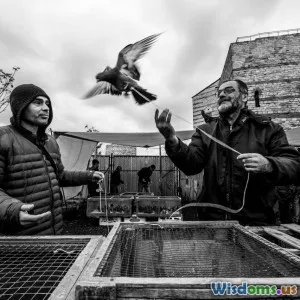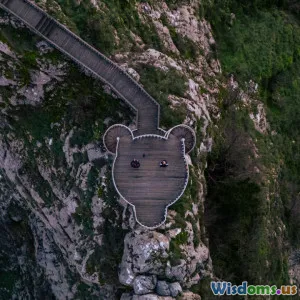
Experiential Travel: Focusing on Quality
9 min read Explore experiential travel focused on quality for deeper, meaningful journeys that enrich your life beyond sightseeing. (0 Reviews)
Experiential Travel: Focusing on Quality
In a world saturated with Instagrammable snapshots and bucket-list checklists, the true essence of travel is often lost. Amid fast-paced tourism, a growing movement emphasizes quality over quantity — experiential travel that goes beyond visiting landmarks. This approach invites travelers to engage with destinations authentically, creating meaningful connections, deeper understandings, and unforgettable memories.
What is Experiential Travel?
Experiential travel prioritizes immersion and personal growth rather than simply ticking off sights. It encourages travelers to live like locals, participate in cultural activities, understand traditions, and be actively present. As illustrative data suggests, travelers increasingly seek local experiences, with a 2022 report by the Adventure Travel Trade Association stating that 70% of travelers now prioritize authentic engagements over conventional tours.
From Passive to Active Engagement
Traditional tourism often results in superficial interactions—photos taken without context, crowded tours, and fleeting encounters. In contrast, experiential travel cultivates active participation. For example, rather than just visiting a vineyard in Tuscany, a traveler might learn the art of winemaking through hands-on vineyard work, conversations with vintners, and participating in wine tastings that emphasize history and process.
Why Quality Matters in Travel
The Shift from Bigger to Better
Mass tourism statistics tell a story of over-tourism and diminishing returns; destinations like Venice and Machu Picchu have seen detrimental environmental and cultural impacts from excessive visitor numbers. Quality-based experiential travel counters this by emphasizing fewer destinations but deeper engagement.
Quality experiences lead to enhanced emotional satisfaction and a more lasting impact on travelers, as psychology expert Dr. Simon Moss highlights: “Travel that fosters immersion promotes not only cultural empathy but also personal transformation.” This approach benefits both travelers and host communities through respectful exchanges.
Environmental and Cultural Sustainability
Choosing quality can also minimize ecological footprints. It's about supporting small-scale, community-driven initiatives rather than large, exploitative corporations. For example, instead of carbon-heavy multi-destination trips, travelers might spend more time volunteering at conservation projects or supporting indigenous craftsmanship, preserving cultural heritage and nature alike.
How to Prioritize Quality in Experiential Travel
Research and Planning with Purpose
Quality-focused travel starts with intentional planning. Select destinations that encourage interaction over observation—a town with local markets, craft workshops, or guided cultural walks.
For instance, during a visit to Kyoto, rather than hopping between crowded temples, travelers can participate in a traditional tea ceremony conducted by local practitioners. This personalized interaction provides understanding beyond visual appreciation.
Engage Locally and Respectfully
Connecting with locals authentically involves listening and openness. Staying in family-run guesthouses or homestays instead of international hotels offers invaluable insights into everyday life.
In Costa Rica, many communities offer eco-tourism experiences led by local guides, such as night tours to spot sea turtles or cacao harvesting activities. Such experiences foster cultural dialogue, mutual respect, and support local economies.
Slow Travel Enhances Experiences
Slow travel complements experiential tourism by encouraging travelers to savor time and surroundings, reducing rushed itineraries. Spending several days or weeks in one area allows richer exploration, meaningful relationships, and deeper understanding.
A notable example is the Japanese concept of "forest bathing" or shinrin-yoku, where visitors take tranquil forest walks to connect with nature and enhance well-being. Spending time mindfully in nature can be a profound, quality-driven experience.
Learn Through Participation
Participating in workshops, cooking classes, or farming activities transforms travelers from observers into contributors. Exploring Bali’s traditional cooking schools, where visitors learn to prepare Indonesian dishes with local farmers, exemplifies quality travel that merges culinary arts with cultural heritage.
The Benefits of Quality-Driven Experiential Travel
Personal Growth and Expanded Perspectives
Travel is often a catalyst for growth, but quality experiences deepen this process by fostering awareness and empathy.
Renowned travel writer Pico Iyer emphasizes: “The most sane thing in the world is to go on traveling—not seeing specific sights but becoming someone else, somewhere else.” Experiential travel enables this transformation by broadening perspectives through genuine cultural immersion.
Lasting Memories and Storytelling
A quality-focused trip yields stories and memories that transcend time. Instead of fleeting photos, travelers are equipped with anecdotes of shared meals, collaborative projects, and lessons learned.
Take the example of a New Zealand trip involving Maori cultural festivals, where visitors partake in traditional dances, listen to ancestral stories, and contribute to community initiatives. These moments create profound meaning and lifelong recollections.
Supporting Communities and Ethical Tourism
Focusing on quality promotes responsible tourism. Travelers contribute economically and socially to communities through direct involvement, fostering sustainable development.
WWOOFing (World Wide Opportunities on Organic Farms) is a global network that encourages travelers to work on organic farms in exchange for accommodation. This model benefits hosts environmentally and economically, while guests gain practical skills and cultural insight.
Real-World Insights
- Adventure Travel Trade Association (ATTA): Reports steady growth in travelers seeking purposeful and sustainable experiences.
- Booking.com 2023 Survey: Nearly 65% of travelers prefer to spend more time at a single destination rather than visiting multiple places hastily.
- Traveler Testimonial: Anna Lopez says, “My cooking lessons in Morocco connected me to the culture more than any museum visit ever did.”
Conclusion: Embrace Depth Over Distance
In an era where travel often masquerades as a check-list race, experiential travel focusing on quality is a refreshing redefinition of what it means to explore the world. By seeking immersive, authentic experiences through local engagement, slow travel, and purposeful planning, journeys become powerful catalysts for personal growth, cultural understanding, and sustainable impact.
The next trip doesn’t need to be longer or cover more ground—making it deeply meaningful is the real adventure.
Are you ready to dive beyond sightseeing and embrace travel that enriches your soul? Start planning your next quality-driven experience and transform the way you see the world.
References & Further Reading:
- Adventure Travel Trade Association, "The Rise of Experiential Tourism," 2022
- Booking.com Traveler Insights Report, 2023
- Moss, Simon, PhD, "Psychology of Immersive Travel," Journal of Travel Research, 2021
- Iyer, Pico, "The Art of Stillness: Adventures in Going Nowhere," 2014
- World Wide Opportunities on Organic Farms, WWOOF International
Rate the Post
User Reviews
Popular Posts





















